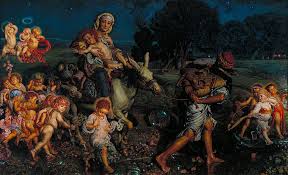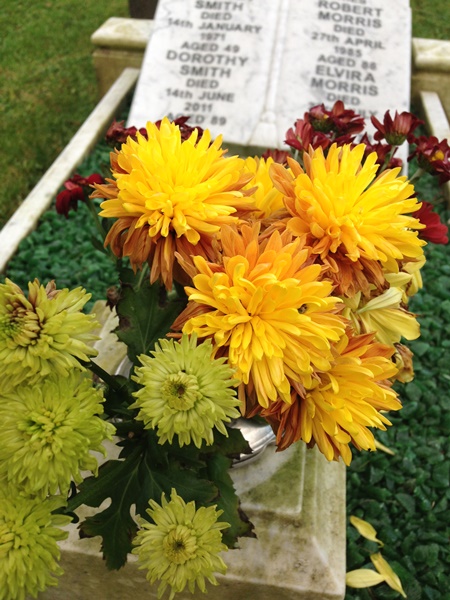It always seems strange that we should be told to ‘fear’ God, but there is a real difference between being afraid of and fearing something. This difference is explored in my sermon for the Second Sunday after Trinity and can be heard here or read below. The reading is Matthew 10:24-39
May I speak and may you hear through the Grace of our Lord; Father, Son and Holy Spirit. Amen
I wonder, what are the things that frighten you? Some people are afraid of the dark, others of creepy, crawly things, others of seemingly illogical inanimate objects, such as buttons or patterned carpets. Most of the time we can live with these fleeting moments of panic when we encounter these things, because our challenge is to put these ‘fears’ into perspective.
A few years ago, when I was sat 15,000 feet up in the air, with my legs dangling out of the door of a light aircraft, strapped to another human being whom I had only met about half an hour ago, relying on strips of canvas and silk panels to prevent me from plummeting to earth at speeds of up to 300 miles an hour, I was filled with a sense of fear for a brief moment, but logic told me I was in safe hands – this wasn’t my tandem partner’s first jump, everything had been checked and they knew what they were doing. Also, God knew what I was doing
There is a great difference between being afraid of something and fearing something. The former keeps us alert and aware of actual or perceived dangers, the latter works on our mind and conscience to allow us to make choices to mitigate what we might be fearful of. This morning’s gospel, therefore, continues Jesus’ message to his disciples of the challenges they will face in the coming days, weeks and years and reminds us of those same challenges that we face as disciples of Christ.
The passage starts though with a reminder that we don’t always have all the answers out of our own intelligence but need to emulate those considered to have a greater knowledge and understanding. I’m guessing though that the word that hits slap bang into our consciousness when we read the first verse is the word ‘slave’. We need to appreciate why Jesus should be so casual using this as an example. Here we have Jesus talking about slavery, which in this current time can be a divisive point of contention, and whilst not dismissing or condoning the abhorrent practice, we have to accept that slavery was just one circumstance of everyday life in Jesus’ time. Historically we have to acknowledge that this did happen and at the time was conventional, which is why Jesus is using it to highlight a disparity of power.
What Jesus appears to be saying is that until we gain knowledge there will always be those who have a position of power over us, but the good teacher passes on their learning in a way that empowers the student, the good employer seeks to build up their staff do the work to the best of their ability and both will inspire others to grow and even overtake them in knowledge and understanding
However, the ‘head’ of a household in which there is abuse, deceit and sometimes evil will simply wish to subjugate those under their control and deny them a chance to find freedom from fear which stifles their growth. If they choose to condone and uphold this way of thinking that is their choice; and shamefully, we have to acknowledge that it is very difficult for those who do break out of these situations without becoming unjustly tainted with the broad brush of prejudice. Fear is often the thing that holds them in thrall
‘So have no fear of them; for nothing is covered up that will not be uncovered,
and nothing secret that will not become known.
What I say to you in the dark, tell in the light;
and what you hear whispered, proclaim from the housetops’.
To understand who ‘them’ refers to, we have to go back to last week’s gospel, when Jesus was warning his disciples about the coming persecutions they were to face, when they would handed over to the authorities, flogged and denigrated, betrayed by those they loved, brother betraying brother. They were to endure all of these things in order to achieve salvation, but it would be a fearful, uncompromising, itinerant life, but one which would eventually reveal the truth.
Nearly all of the original disciples would pay the ultimate price of having their lives cut short as they died at the hands of those who misunderstood the message they shared, who felt their authority was being threatened, who did not have respect for the value of a human life. However, it was their faith and their fear, not of humans but of God, that enabled them to bear this. That leads us though to question why we should ‘fear’ God, who after all is the essence of love.
The Jews, were certainly aware of this need to fear God, but knowing this did not mean that they forgot about love or that it was the greatest thing, but that they were sure that in relation to God there was both fear and love. Listen to what the psalmist says,
‘For as high as the heavens are above the earth, so great is his steadfast love toward those who fear him; as far as the east is from the west, so far does he remove our transgressions from us. As a father shows compassion to his children, so the Lord shows compassion to those who fear him’. Psalm 103:11-13
But we do not have to fear God in the way that we fear a tyrant or dictator, but it is a fear of awe and reverence and therefore provides us with the security that our souls and bodies will not be destroyed.
Neither the Jews nor Jesus ever attempted to sentimentalise the love of God; God is love, but God is also holiness. This reverent fear also brings reassurance for those who are willing to be disciples. From Proverbs (14:26-27), ‘Whoever fears the Lord has a secure fortress, and for their children it will be a refuge. The fear of the Lord is a fountain of life, turning a person from the snares of death‘. God’s omnipotent power over life and death is tempered with the amazing revelation of our worth to him. The knowledge that God doesn’t let a sparrow fall without his knowing; who knows every hair on our head, and counts us as of more value than some birds that are sold in the marketplace two a penny, reassures us that God knows the temptations and dangers that we face in our life when we choose to acknowledge and follow God’s call to take his message into the world.
Just like Jesus was warning his disciples that they faced opposition and persecution, when we ‘preach’ the gospel either in our words or lives, we shouldn’t be surprised that our reception is not always met with enthusiasm. After all why should we expect a better reception than Jesus himself received? But fear of opposition should not be a reason to give up. We can feel afraid when we hear of fellow Christians suffering in many parts of the world, who are being persecuted for sharing their faith, but we can also uphold them in prayer. We can feel tension when we hear of divisions in families caused by firm stands on religious principles, but we can also pray for better understanding and a respectful peace.
Our fear of God should actually be an encouragement; to those that are faithful there is the ultimate divine reality of life. To those that deny it, there will be retribution. The fact is that our relationship and duty to Christ has to have priority over every other relationship, which sometimes means having to embrace a way of hardship, even of death
As we proclaim in the words from Deuteronomy (10:12) ‘What does the Lord your God require of you, but to fear the Lord your God, to walk in all his ways, to love him, to serve the Lord your God with all your heart and with all your soul’, being a disciple of Jesus is a challenge, but the weight of your personal cross will never be too heavy for you to bear, even if sometimes it can seem so. With God, our fear should be based on the consequences should we fail to follow the teaching and guidance that he has given us through Jesus, and fail to trust that he has our back when we faced with dilemmas and situations that sometimes seem beyond our control
For what are we to be afraid of? The darkness; when we can’t see a way forward? The unknown, when we don’t understand what’s happening? The loss of love, when we feel rejected? Within our darkness there is light, within our confusion, there is clarity, within our desolation there is comfort. And in all of these we have one thing that we can hold onto with certainty, the love of God.
God is the ultimate person to be revered, God is the ultimate person to hold in awe, God is the ultimate person to trust with our lives. All others will fall short. When we choose to pick up the cross of Jesus, yes, we will be afraid from time to time, but ultimately it will be our fear of God that will secure the final victory over everything else.
Amen




















